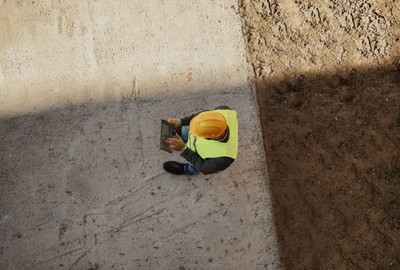Randstad offers a range of services and information designed to help job seekers in the construction industry get into – or back to – work in construction jobs.
We offer a large amount of information about employers who have positions available, and offer assistance with the whole process of upgrading qualifications, completing job applications, and preparing for interviews.
In this last respect, there are a number of specific factors to bear in mind when preparing to attend an interview for a construction job.
Construction jobs that require interviews.
Firstly, it is important to know what types of jobs in the construction industry employers require interviews for.
In all cases it will be necessary for applicants to attend interviews for jobs in civil engineering, surveying, construction site management and other technical construction-related fields. It is normally not necessary to attend formal interviews for standard trade jobs.
What do interviewers looking for?
Essentially, interviewers look for job applicants who have the necessary skills and attributes to enable them to fit smoothly into the existing team as well as the company’s operating culture.
Such skills are not limited to technical construction skills, although these are certainly important. The candidate should also be able to display sufficient expertise when it comes to managing customer relationships and project management if the role requires it.
The applicant’s general educational level – including literacy and numeracy – will also be considered.
Types of interviews.
Although the typical construction job interview situation may be a face-to-face meeting with a small group of senior construction team members, there are other possibilities that candidates may need to prepare for.
Interviews by telephone or by using multimedia channels, such as video conferencing, are becoming increasingly popular; this is particularly true in the first round of interviews during which the employer is working towards creating a shortlist of qualified candidates.
On the other hand technical interviews, which seek to establish – often in practical terms – the level of ability of an applicant in construction tasks, are also used on occasion.
This latter type of interview may need special preparation, but the instructions for this are likely to come with the invitation to the interview.
Our recruiters in the construction, property and engineering sectors outline their number one interview preparation tip in the video below:
Possible construction interview questions and answers.
It is a good idea – in advance of the interview – to go over some of the questions that may be asked by the interviewer(s).
Many of these are likely to be general in nature and deal with career aspirations, strengths and weaknesses, career history, likes and interests, and other areas which help the interviewer to form a more complete picture of the candidate.
In particular, it is good to have a plan for answering questions such as ‘What is your biggest strength?’ ‘What is your greatest weakness?’ and ‘Where do you see yourself in five years from now?’
These questions all require positive answers, and should in some way address the stated needs of the employer according to the published job description.
However, attention should also be paid to potential questions of a more technical nature. A few examples of such questions are listed below.
Interview questions and answers.
- What steps do you take to prevent injuries occurring in the workplace?
Safety at the workplace, or on the construction site, is a key issue for employers in the construction industry. A question such as this gives the candidate an opportunity to demonstrate an understanding of the importance of safety, and to comment on his or her track record with regard to maintaining personal safety and the safety of others. It is a good idea to refer to previous experiences and to describe how you have handled safety issues on the worksite successfully in previous positions.
- What are the top items on your checklist before you leave the construction site at the end of the day?
This practical question is used to check for awareness of the things that need to be done to secure a construction site. Safety and security are priority issues, so these need to be the primary focus of the items that you choose to mention. Once again, it can pay dividends to describe a previous situation in which you have used such a checklist, or to mention the things that you got into the habit of checking when working for a former employer. This sort of question offers the applicant a chance to demonstrate a commitment to personal responsibility.
- If a customer or employer complained about the quality of your work, how would you deal with this?
‘What if’ questions – also known as ‘scenario questions’ – are quite common in job interviews. They not only check a candidate’s method of thinking through a problem, but also reveal the candidate’s attitude towards the problem. In a case such as this, it is important to remain positive and display no negativity whatsoever about the customer or the employer. If possible, relate the question to a previous real-life experience, even if this did not occur in construction work.
- Have you ever walked off a construction site? If so, what was the reason?
Always be honest when answering questions. The answer to this question may reflect your decision-making process in leaving an area for personal or general safety reasons, or some other legitimate concern. Rather than just saying ‘no’ if you have never walked off a site, the answer can be expanded into a ‘what if?’ scenario.
- Can you describe an occasion when you had to solve a problem with little or no management or direction?
This is an opportunity to highlight one or more of the achievements listed on your curriculum vitae or résumé. Describe the situation you were faced with, the task you took on, the action that you performed, and the result of the action.
Questions you should ask interviewer.
In addition to answering the interviewer’s questions, a candidate is often expected to pose some questions of their own. These questions may arise from the prior discussion, or they may be of a personal nature regarding the terms of the contract. However, it is good to have some professional construction industry questions ready for the interviewer. These may include:
- how do you promote sustainability in your construction projects?
- have you been personally involved in any of the company’s landmark projects?
- what do you find most enjoyable about working for this company?




